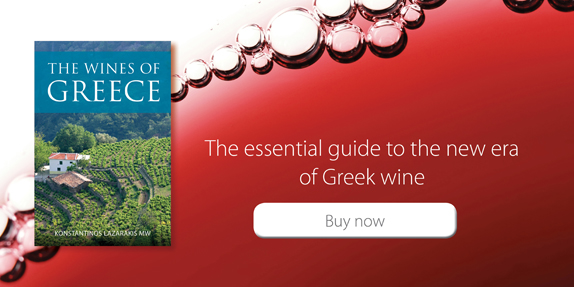Sun, sea and Savatiano: why the future looks bright for Greek wine
22 January 2018 by Rebecca in Classic Wine Library, Wine and spirits
Be honest, when was the last time you picked up a bottle of Greek wine in your local wine shop or at the wine merchant? If you never even consider buying Greek wine except on holiday in Greece you are not alone. Many of us think of retsina and ouzo – and don’t want to drink either – when the subject of Greek alcohol is raised. Although Greece has the longest winemaking tradition in Europe, and made some legendary wines in Classical times, the wines produced for most of the modern era have not been of a high quality. But a new book by Greece’s first Master of Wine, Konstantinos Lazarakis, claims that today’s Greek wine is exciting, innovative and really rather good.
The Greek wine industry really only began in earnest after the Second World War. Prior to that most of Greece’s population was rural and wine production was small-scale, grown for personal consumption. Grapes grown commercially were used for raisins or sold at a subsidised rate to cooperatives for the production of bulk wine – quality and craftsmanship were not major considerations. From the 1950s onwards a few cult wines and boutique wineries began to emerge but it wasn’t until the 1970s, as Greece began the process of joining the EEC, that the wine industry of today started to take shape. Led by Greek wine’s own Iron Lady, Stavroula Kourakou-Dragona, wine appellation legislation was drawn up. Since then a series of miniature revolutions has led to a flourishing industry – with viticulture the healthiest agricultural sector in the country.
As Lazarakis says, “The image of Greek wine has shifted beyond my imagination. In the past I was trying to convince people that Greece can produce great wines; now that fact is clear, my job has been to explain why these wines are great. Writing this book has been a privilege.”
Growing conditions in Greece mean that vine growers and winemakers have always had to be inventive. With prime agricultural land in short supply, grapes tend to be grown in the places where more essential crops don’t flourish. In some places, such as the island of Santorini, where the winds make growing anything taller than half a metre impractical, this means that growers have had to invent new vine-training systems. This adaptability and innovativeness shows through in the sheer variety of wines available across the country.
And as for the retsina? Even that has improved vastly, with producers such as Stelios Kechris, in Thessaloniki, devoting themselves to producing groundbreaking resined wines.
For anybody interested in changing their preconceptions of Greek wine The wines of Greece is a mine of information. Lazarakis is proud of what his country’s wine producers have achieved and this shows clearly as he takes us through the history of wine growing in Greece, the varieties grown and the conditions they are farmed in. Most of all it is demonstrated through the stories of the people of the wine industry – the producers who create the stunning wines available today.

